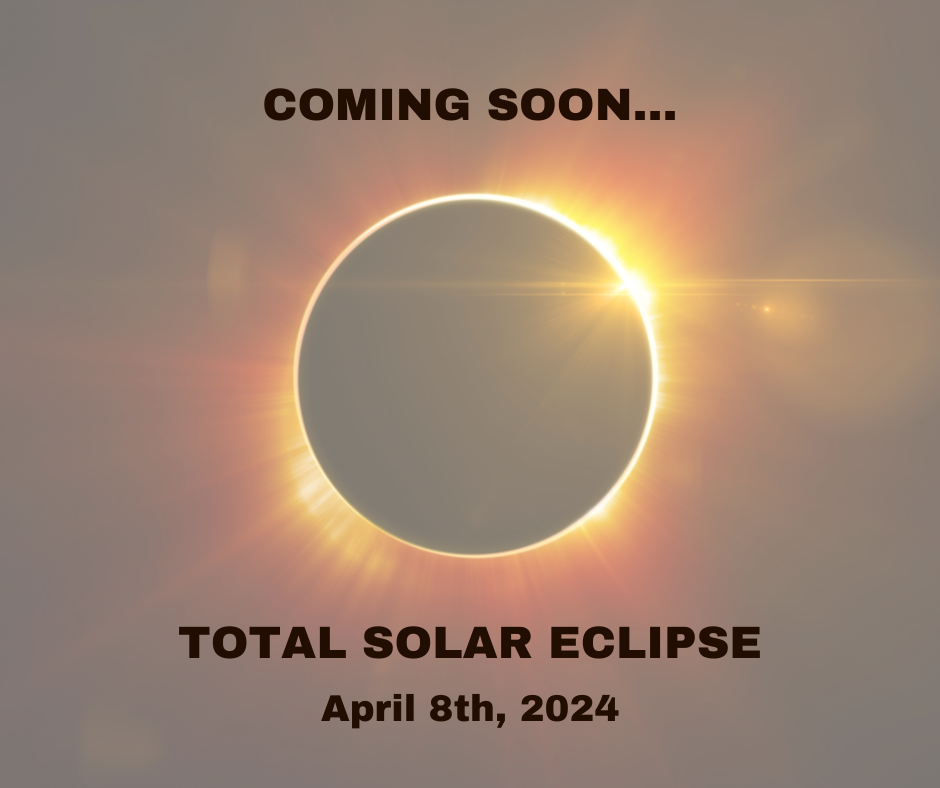On April 8, 2024, a total solar eclipse is set to pass through Illinois! Our Friends at the Illinois Optometric Association have kindly provided our office with a box of official Solar Eclipse Glasses! Along with State Senator Seth Lewis, we will be distributing the glasses to various schools and park districts in our district.
Also, here is some helpful information from the IOA on how to properly use and maintain your glasses.
- Always inspect your solar filter before use; if scratched, punctured, torn, or otherwise damaged, discard it. Read and follow any instructions printed on or packaged with the filter.
- Always supervise children using solar filters.
- If you normally wear eyeglasses, keep them on. Put your eclipse glasses on over them, or hold your handheld viewer in front of them.
- Stand still and cover your eyes with your eclipse glasses or solar viewer before looking up at the bright Sun. After looking at the Sun, turn away and remove your filter — do not remove it while looking at the Sun.
- Do not look at the eclipsed, partially eclipsed, or annularly eclipsed Sun through an unfiltered camera, telescope, binoculars, or other optical device.
- Similarly, do not look at the Sun through an unfiltered camera, telescope, binoculars, or any other optical device while using your eclipse glasses or handheld solar viewer in front of your eyes — the concentrated solar rays could damage the filter and enter your eyes, causing serious injury.
- Seek expert advice from an astronomer before using a solar filter with a camera, telescope, binoculars, or any other optical device; note that solar filters must be attached to the front of any telescope, binoculars, camera lens, or other optics.
Manufacturers of hard plastic eclipse glasses often supply a microfiber pouch that you may use to wipe the lenses clean. The same pouch may be used on the lenses of cardboard eclipse glasses and handheld solar viewers. You may also wipe them clean with any soft, nonabrasive tissue or cloth; Kimwipes are also suitable, but baby wipes and other wet wipes are not suitable. Cardboard must be kept dry; if it gets wet, it will swell and likely detach from the lenses. Do not use water, glass cleaner, or any other solvents or liquids to clean cardboard eclipse glasses and handheld solar viewers.
The ISO 12312-2 standard was based, in part, on decades of experience using welding filters for observing the Sun. A welding filter with a shade number of 12 or higher transmits a safely tiny percentage of the Sun’s light across the spectrum, whether made of tempered glass or metal-coated polycarbonate. Most observers find the view through a shade 12 welding filter uncomfortably bright and the view through a shade 15 or higher-numbered welding filter unattractively dark. The “sweet spot” is shade 13 or 14, which best matches the view in purpose-made eclipse glasses and handheld solar viewers, except that the image is green rather than yellow-orange or white. Shade 13 and 14 welding filters are rarely stocked in welders’ supply stores, though, so you’ll probably have better luck finding them by shopping online. A good source of glass shade 14 welding filters is safesolarviewing.com.
You should not use adjustable and/or auto-darkening welding helmets or similar products to view the Sun. Many don’t go as dark as shade 13 or 14, and even those that do post a grave risk to your eyesight, either because you accidentally adjust them to an unsafe setting or because they don’t auto-darken fast enough when you look at the Sun with them.
ENJOY THE SOLAR ECLIPSE RESPONSIBLY!
